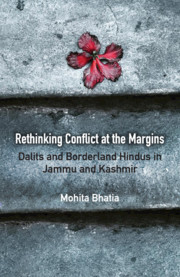Book contents
- Frontmatter
- Contents
- List of Figures and Tables
- Preface
- Acknowledgements
- 1 Introduction
- 2 Regional Diversities and the Conflict
- 3 Caste, Everyday Life and Conflict Politics
- 4 Border Realities: Contesting Hegemonic Paradigms of Nationalism and Conflict
- 5 Contesting the Homogenised Discourse of Religious Identities
- 6 Conclusion
- Glossary
- Bibliography
- Index
5 - Contesting the Homogenised Discourse of Religious Identities
Published online by Cambridge University Press: 30 April 2020
- Frontmatter
- Contents
- List of Figures and Tables
- Preface
- Acknowledgements
- 1 Introduction
- 2 Regional Diversities and the Conflict
- 3 Caste, Everyday Life and Conflict Politics
- 4 Border Realities: Contesting Hegemonic Paradigms of Nationalism and Conflict
- 5 Contesting the Homogenised Discourse of Religious Identities
- 6 Conclusion
- Glossary
- Bibliography
- Index
Summary
Religion is so vast that in it all races can co-exist without polluting the air. Religion is like the endless sky; it can stay clean even with millions and millions of human beings, animals and birds, insects and worms breathing into it.
I had felt that I had found my religion at last, the Religion of Man, in which infinite became defined in humanity and came close to me so as to need my love and cooperation
— Rabindranath TagoreIntroduction
from acquiring primacy in some situations to losing its significance in other contexts. It seeks to explore the extent to which political discourse influences and shapes the social responses of people and the ways in which people, situated within a complex social interactional network, override or endorse political assumptions that are based on the primacy of religion.Previous chapters have demonstrated the various ways in which marginalised groups among Hindus locate themselves within and negotiate with the normative social structure as well as the dominant political discourse. Through an analysis of caste and border dynamics, an attempt has been made to highlight the differences, contradictions and contestations within the Hindu identity and problematise the notion of its cohesive existence. The dominant political discourse that confers Jammu a ‘Hindu’ identity is based on the idea of a ‘Hindu’ monolith. Although the ‘Hindu’ identity is articulated in opposition to ‘Muslim Kashmir’, its assertion in politically heightened situations alienates Muslims of Jammu as well. The pro-Hindu basis of Jammu's politics presumes that religion has a primary role in society and that there is an essential demarcation between ‘Hindus’ and ‘Muslims’. This chapter aims to question this basic premise by looking at the role of religion in Jammu's society and inter-community relations in everyday life. It does not accept or deny the role of religion in crystallisation of identities in social and political spheres, but in fact offers a broad spectrum in which religion as one of the identities engages with other sets of identities –
This chapter is divided into two sections and makes two broad points:
I. The social heterogeneity and cultural plurality of Jammu's society allow space for individuals and groups to have multiple and changing social affiliations. Not only is religion one among those affiliations but it is also internally fractured in terms of factors such as caste, class and tribe, thus refuting the political claim of a homogeneous Hindu identity.
- Type
- Chapter
- Information
- Rethinking Conflict at the MarginsDalits and Borderland Hindus in Jammu and Kashmir, pp. 104 - 159Publisher: Cambridge University PressPrint publication year: 2020



